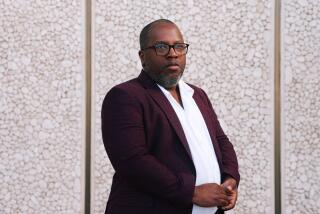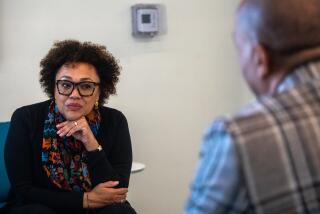A New Stage in His Life : ‘Our Gang’ Actor Shares His Knowledge With a New Generation
- Share via
COMPTON — On Saturdays, Eugene W. Jackson, 75, walks a block to his Compton studio to teach tap and jazz dance to promising young dancers and actors.
One of his proteges is Zaaid Leflore, 12, of Lynwood and another is Jackson’s grandson, Melvin Black, 10. The two have formed a team called The Little Steps and are preparing to enter a talent contest in Hollywood.
“I am giving them all my expertise in show business,” said Jackson, who was only 6 when he started playing Pineapple, a character in the “Our Gang” comedies in the 1920s and ‘30s. He has been in the business ever since.
“When Zaaid started taking private lessons from Mr. Jackson five years ago, he was very shy,” said Janette Leflore, Zaaid’s grandmother. “Mr. Jackson gave him confidence in himself. He tells his students, ‘If you know you can do something, you can do it.’ ”
Jackson got his own start at a Saturday afternoon talent contest in the early 1920s at the Rosebud Theater at 20th Street and Central Avenue in Los Angeles. He won first prize dancing the shimmy and singing “You Got to See Your Mamma Every Night or You Can’t See Mamma at All.” The prize was a box of groceries.
“I kept entering every week and coming in first, and the box of groceries would feed us for the coming week,” he said.
His mother, Lillie Baker, a single mother with two children, decided to get her talented son into the movies.
His first role was as an extra in “Her Reputation,” with silent-film star May McAvoy. During the filming, Jackson was accidentally pushed into a fishpond.
“I fell in the water and came up with big eyes because I was scared,” Jackson said. “I couldn’t swim. They paid me $7.50 instead of the usual $5 and told my mother that Hal Roach was looking for a little boy to replace Ernie (Sunshine Sammy) Morrison, another young black actor who was featured in the “Our Gang” comedies.
With his break into show business, Jackson also was introduced to the differences in treatment for white and black actors. Morrison’s father had pulled his son out of the series to go into vaudeville because the young actor was being paid less than the white children.
Jackson and his mother signed a two-year contract, and he started at $30 a week. After six months his salary rose to $55 a week.
“At that time, the white children were receiving $75 a week,” Jackson said.
Jackson played Pineapple, Farina’s older brother. Farina, a winsome 3-year-old played by Alan Clayton Hoskins, was one of the most popular characters in the series.
Success made life easier for Jackson, his mother and his brother, Freddie Baker. They moved from their one-room apartment to a four-room duplex near Central Avenue, then a mecca for black actors.
Jackson’s “Our Gang” contract was up when he was 9, and he left the series. He said Mack Sennett then signed him as the only black child in the Buster Brown comedies. Jackson also appeared in a feature-length silent film, “Little Annie Rooney” starring Mary Pickford.
During the early era of movies, films followed strict conventions, and actors, especially minorities, portrayed stereotypes.
“There was always a fat kid and a freckle-faced kid, and black kids had to look the part,” he said. “They would put stuff on my hair to make it look kinkier. My brother was considered too light skinned to be in the movies.”
Today, many historians believe the treatment of African-Americans in early films contributed to racism in the United States.
“Movies have always been America’s most popular art form, but until very recently they have been responsible for reinforcing some of the most ugly stereotypes of black people and other minorities,” said Dr. Joyce Johnson, professor of English and director of the African-American studies program at Cal State Dominguez Hills.
“Today, some activists call us ‘Uncle Toms,’ ” Jackson said. “This is unfair, because at the time it was work for us. Even as a child, I was able to provide for my family with film work.”
His first talking film, “Hearts in Dixie,” produced by Fox in 1928, was billed as the “first all-singing, all-dancing, all-Negro musical.” He also appeared in “Cameo Kirby,” another film set in the South and filmed on location on the Sacramento River.
“In that film I sold watermelon,” Jackson said.
In 1931, he was featured as a humorous servant boy in the Academy Award-winning “Cimarron,” starring Richard Dix and Irene Dunne.
“Then I hit the awkward age, too old to play kids and too young to play adults,” Jackson said.
In the 1930s Jackson, then in his teens, and his brother, Freddie, formed the Jackson Brothers and toured the West singing, dancing and doing impressions.
One night at the Garfield Theater in Alhambra, the brothers were booked on the same bill with the Gumm Sisters.
The girls’ mother bragged that scouts from MGM were coming to the theater to see her daughters perform.
The youngest “went on to become Judy Garland,” Jackson said.
In 1932, Jackson went on tour playing in 89 cities in the West and Midwest. Jackson was billed in newspaper ads as “Hollywood’s most famous colored kid star.”
Segregation was the rule of the day, and it was often difficult to find lodging, especially in smaller towns, he said. In Los Angeles, the Dunbar Hotel on Central Avenue catered to black performers.
“On the road, if there wasn’t a black hotel or rooming house, we tried to find a black family to stay with, usually across the tracks,” Jackson said.
Segregation continued well into the 1950s, when Jackson and his brother--along with a hired piano player--formed the Jackson Trio and toured the West with their families. Jackson played saxophone and his brother played drums.
“On one occasion we traveled all night from Walla Walla, Wash., to Medford, Ore., where we were going to perform,” Jackson said.
“When we got to Medford, the motel where we stayed before refused to let us in, even though there was a vacancy sign outside. Luckily, we were able to stay in the motel my brother found.”
Recent years have been kinder to Jackson and his wife, Sue.
“We moved to Compton from Los Angeles in 1956 because we found a house with a large yard that had trellises and rambling roses,” Sue Jackson said.
In the 1960s, Jackson played Diahann Carroll’s uncle on the television situation comedy “Julia.” He also taught his children to dance and began giving neighborhood children lessons in his garage. He charged a dollar for a lesson, but if a youngster could not pay, the lesson was free, he said.
The classes grew, and Jackson opened the Stage Workshop dancing school near his home.
Five of his dancers were picked to perform in the Samuel Goldwyn production of “Porgy and Bess.”
Although he was recently hospitalized with a respiratory infection, Jackson is generally active. He still gives private lessons, works on his steps and passes along what he knows of show business to the younger generation.
His daughters, Sue Carol Black of Altadena and Hazel Clark of Yorba Linda, teach classes at the school, and his son, Eugene Jackson III, is a camera operator on the shows “Hearts Afire” and “The Burt Reynolds Show.”
In spite of discrimination in the early days of Hollywood, Jackson recalls his career with fondness.
“It’s been a good life,” he said. “I didn’t make the big money, but I’m better off today than some of those who did.”
More to Read
The biggest entertainment stories
Get our big stories about Hollywood, film, television, music, arts, culture and more right in your inbox as soon as they publish.
You may occasionally receive promotional content from the Los Angeles Times.










